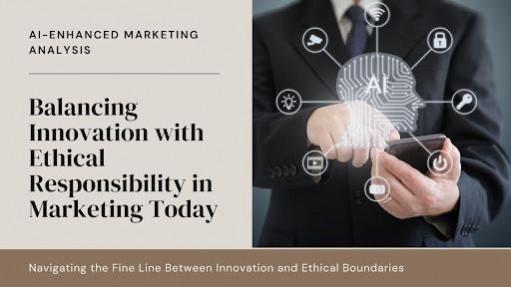
The rapid advancement of artificial intelligence (AI) in marketing has revolutionized the industry, offering unprecedented opportunities for personalization and efficiency. However, this technological leap comes with significant ethical concerns that need to be addressed to ensure responsible usage. From manipulating consumer behavior to breaches of privacy and dissemination of misinformation, AI's role in marketing presents a complex landscape that requires careful navigation, per Sravan Yella.
Innovations in AI-Enhanced Marketing
AI has revolutionized marketing on social media, utilizing machine learning, natural language processing, and predictive analytics. These tools enable marketers to analyze data and optimize efforts. Accenture's case study showed an AI recommendation system increased an e-commerce company's conversion rates by 40% and cut acquisition costs by 30%.
Moreover, the Marketing AI Institute found that 84% of marketing leaders believe AI will profoundly
impact their field within the next five years. This sentiment is supported by real-world data showing how AI can enhance marketing strategies, such as personalized product recommendations that significantly increase click-through and conversion rates.
Ethical Dilemmas in AI-Enhanced Marketing
Despite its benefits, AI in marketing raises several ethical issues. One major concern is the manipulation of consumer behavior. AI systems can tailor content, recommendations, and advertisements to individual preferences, potentially exploiting psychological vulnerabilities to influence purchasing decisions. The World Economic Forum highlighted the risks of AI algorithms manipulating consumer choices, emphasizing the need for ethical guidelines to prevent misuse.
Privacy breaches are another critical issue. AI-driven data collection on social media often blurs the line between personalization and surveillance. Studies show AI can accurately predict personal information, like political affiliations, from social media activity. The 2023 data breach, exposing the biometric data of 150 million users, highlights the significant misuse potential. This incident underscores the urgent need for robust data protection regulations and transparent AI practices to safeguard privacy.
AI's role in spreading disinformation is concerning. Algorithms often prioritize sensational content, fueling fake news. During the 2024 U.S. presidential election, AI-generated political content confused many users. Effective fact-checking and media literacy education are crucial to combat this issue.
Responsible AI Practices in Marketing
Addressing ethical AI challenges requires transparency. Marketers should disclose AI use in decision-making, fostering consumer trust and informed choices. The IEEE Standard for Transparency of Autonomous Systems offers guidelines to communicate AI capabilities, limitations, and risks, enhancing stakeholder understanding and trust.
Bias mitigation is another crucial aspect. AI models can inadvertently perpetuate biases in training data, leading to unfair ad targeting and pricing outcomes. Regular audits and fairness checks are essential to ensure equitable treatment of all customer groups. The IEEE Standard for Algorithmic Bias Considerations offers a framework for identifying and reducing biases in AI algorithms, promoting fairness and non-discrimination.
Despite AI's automation, human oversight is essential. In 2023, an e-commerce company saw increased returns and decreased satisfaction due to fully automated service. Incorporating "human-in-the-loop" in AI processes ensures outcomes are reviewed, enhancing accountability and maintaining balance.
The Impact on Social Media
AI-driven algorithms that curate content on social media platforms can create "echo chambers," where users are only exposed to information that reinforces their existing beliefs. This phenomenon exacerbates political polarization and can negatively affect mental health. To counter this, social media platforms have introduced features promoting diverse perspectives. For instance, Twitter's "Perspective Diversity" feature encourages users to engage with content from different viewpoints, fostering a healthier information ecosystem.
In all, AI has undoubtedly transformed marketing, offering innovative solutions for personalization and efficiency. However, these advancements come with significant ethical considerations that must be addressed. By prioritizing transparency, bias mitigation, and human oversight, marketers can harness the power of AI responsibly, enhancing customer experiences while safeguarding ethical standards. Hope Sravan Yella's insights on AI and marketing help you understand the advancement of artificial intelligence (AI) in marketing.
















